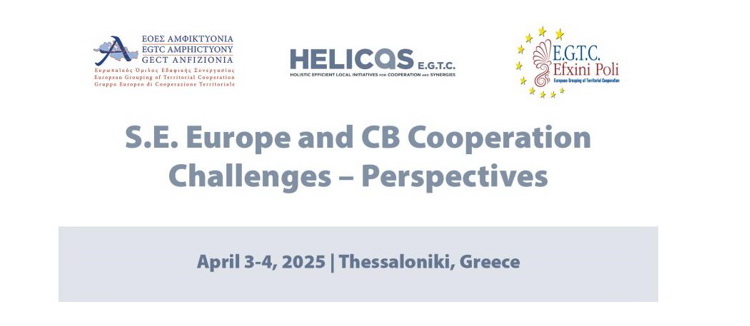
CONLUSIONS
In Thessaloniki on April 3 and 4, over 200
representatives of subnational actors in cross-border cooperation participated
in a conference entitled “Cross-border Cooperation in S.E. Europe, Challenges,
Problems, Prospects”, continuing a creative dialogue that began in
Sofia in 2023.
A dialogue that in its first stage established the
dominance of economic incentives in our cooperation over any other form of
collaboration.
A dominance that, of course, can only have a positive
reading, as it mobilizes actors, creates results even if imperfect, contributes
to a process of spontaneous Europeanization, which, however, cannot guarantee
the best response to challenges.
Most of the time, they can be considered ineffective because
the available resources of the INTERREG program are insufficient for the
spatial scale at which they attempt to intervene, or they finance endogenous
development without a particular cross-border impact or are not effectively
coordinated with other structural programs.
Indeed, natural ecosystems, cross-border residential
areas, health, the climate crisis, and civil protection necessitate a distinct
approach.
They require duration in time, integrated planning,
political will, stability, and ultimately, mobilization around a common vision.
Therefore, even macroscopically, it is possible to argue
that the issues of governance and integrated spatial planning are absent from
this cooperation.
More specifically, these issues are rather absent from
the sphere of public debate, together with the imperfect tools available.
During the conference, we had the opportunity to discover
the European experience regarding the governance of natural ecosystems, urban
areas, healthcare, and the networking between subnational actors in territorial
cooperation.
We had the opportunity to discover the strategies of
integrated territorial development and the cooperation of academic
institutions.
However, we also found that we deviate from the European
experience.
A series of objective factors make the wider region of SE
Europe a territorial unit that is required to deepen cooperation and transform
it into a laboratory for producing results with real cross-border effects.
In this direction, we consider - recognize the
importance and significance of the implementation of a distinct roadmap for
improving the characteristics of cooperation in our region.
At its center must be all those issues that concern the
sphere of public debate.
We believe that the issues that need to be addressed are:
1. the visibility of the
available tools,
2. the effective
mobilization of actors through the strengthening of political will and the
improvement of the knowledge and skills of the human resources involved,
3. the addressing of all
those obstacles that do not allow for our more effective mobilization,
4. the strengthening of
bottom-up approaches and
5. the better networking of
all development mechanisms in a continuous but more effective dialogue.
Because European Integration is implemented at the
cross-border level in five stages:
•
Institutional integration with the key role of
EGTCs as multi-level governance laboratories, ensuring the promotion of the
needs of local communities at the higher levels of administration
•
Financial integration with the essential role of
European territorial cooperation programs (INTERREG) that operate as a pilot
for innovative policies and investments.
•
Cognitive integration with the subsequent training
of local and regional authority executives through their participation in
collaborative schemes within the framework of the programs.
•
Administrative integration with the adoption of the
culture of change by local authorities during their collaborations with
corresponding organizations and other bodies abroad.
•
Cultural integration with the consolidation of the
value of solidarity between administrative authorities and local communities at
a cross-border level.
We know that, first of all, we, the actors in
cross-border cooperation in the region, must mobilize more effectively.
We must make more effective use of the challenges, with
the even imperfect tools that are available.
We must address the financial possibilities not as an end
in itself but as a means.
We must read and understand the best practices that are
developing in the EU.
But it is also clear that we cannot address the
challenges more effectively alone. We need help and support.
In this direction, we call on the European
Parliament, the European Commission, the Committee of the Regions, the INTERREG
Managing Authorities, and the Council of Europe to assist in this direction.
We welcome the statement of the President of the
Central Union of Municipalities of Greece on the support of the Greek Local
Government towards strengthening its effort to improve the content and
conditions of cross-border cooperation in the cross-border areas of this
country.
We call on subnational actors in cross-border
cooperation to participate more actively in institutionally guaranteed
territorial cooperation.
We call on technical and scientific executives to
support those initiatives that improve cross-border spatial planning and more
effective networking.
We also call on all levels of administration of the
States of S.E. Europe to:
•
change their restrictive conception of planning in
favor of the local level
•
proceed where necessary with bold reforms that will
allow local authorities, in particular, to act independently and develop
initiatives when they concern the local level
•
work with us in the design and development of
initiatives to strengthen cross-border cooperation, enrich and improve its
content, capitalize and best adapt the European experience,
•
facilitate the adoption of available tools but also
to mobilize the necessary resources in this direction
We must intensify our pace so that the next multiannual
financial framework signals a new type of approach to cross-border regions,
opening up the picture that will go beyond borders.
In conditions of destabilization and intensification of
geopolitical challenges, we have been working and are working for a Europe that
solves its problems with more Europe.